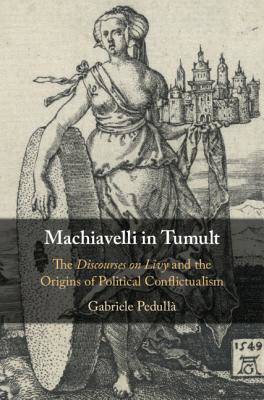
Je cadeautjes zeker op tijd in huis hebben voor de feestdagen? Kom langs in onze winkels en vind het perfecte geschenk!
- Afhalen na 1 uur in een winkel met voorraad
- Gratis thuislevering in België vanaf € 30
- Ruim aanbod met 7 miljoen producten
Je cadeautjes zeker op tijd in huis hebben voor de feestdagen? Kom langs in onze winkels en vind het perfecte geschenk!
- Afhalen na 1 uur in een winkel met voorraad
- Gratis thuislevering in België vanaf € 30
- Ruim aanbod met 7 miljoen producten
Zoeken
Machiavelli in Tumult
The Discourses on Livy and the Origins of Political Conflictualism
Gabriele Pedullà
Hardcover | Engels
€ 183,45
+ 366 punten
Omschrijving
Among the theses that for centuries have ensured Niccolò Machiavelli an ambiguous fame, a special place goes to his extremely positive opinion of social conflicts, and, more in particular, to the claim that in ancient Rome 'the disunion between the plebs and the Roman senate made that republic free and powerful' (Discourses on Livy I.4). Contrary to a long tradition that had always highly valued civic concord, Machiavelli thought that - at least under certain conditions - internecine discord could be a source of strength and not of weakness, and built upon this daring proposition an original vision of political order. Machiavelli in Tumult (originally published in Italian in 2011) is the first book-length study entirely devoted to analyzing this idea, its ancient roots (never before identified), its enduring (but often invisible) influence up until the American and the French Revolution (and beyond), and its relevance for contemporary political theory.
Specificaties
Betrokkenen
- Auteur(s):
- Uitgeverij:
Inhoud
- Aantal bladzijden:
- 298
- Taal:
- Engels
Eigenschappen
- Productcode (EAN):
- 9781107177277
- Verschijningsdatum:
- 30/08/2018
- Uitvoering:
- Hardcover
- Formaat:
- Genaaid
- Afmetingen:
- 164 mm x 234 mm
- Gewicht:
- 557 g

Alleen bij Standaard Boekhandel
+ 366 punten op je klantenkaart van Standaard Boekhandel
Beoordelingen
We publiceren alleen reviews die voldoen aan de voorwaarden voor reviews. Bekijk onze voorwaarden voor reviews.









